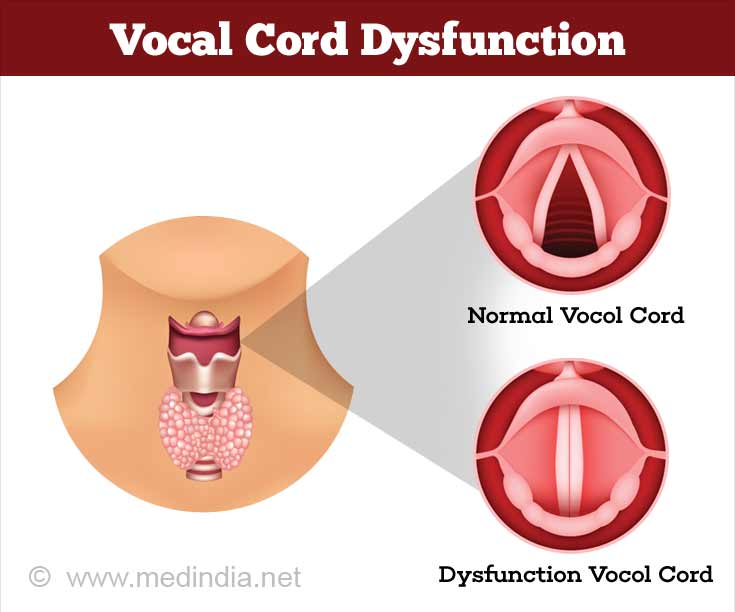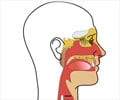- Deckert J, Deckert L. Vocal Cord Dysfunction. Am Fam Physician. 2010;81(2):156-159, 160.
- Vocal Cord Disorders - (http://www.drugs.com/health-guide/vocal-cord-disorders.html)
- Vocal cord paralysis - (http://www.mayoclinic.com/health/vocal-cord-paralysis/ds00670/dsection=symptoms)
About
Patients with Vocal Cord Dysfunction (or) Vocal Cord Malfunction may experience difficulty in breathing, coughing and wheezing, throat tightness or choking, hoarseness in the voice and changes in the voice.
Vocal cords are the bands of elastic muscle tissues, which are located on either side in the voice box. Sound is a result of vibration of these muscle tissues. The vocal cords also have some other functions. They help in the breathing process and prevent food and drinks from entering the airway (windpipe), which can lead to choking.

Vocal cord dysfunction is a condition where the vocal cords open and close inappropriately resulting in partial obstruction to the airways, and therefore difficulty with breathing.
Symptoms of Vocal Cord Dysfunction
Patients with vocal cord dysfunction experience the following symptoms-
- Difficulty in breathing
- Coughing

- Wheezing
- Throat tightness
- Choking
- Hoarseness in the voice
- Changes in the voice
Risk Factors of Vocal Cord Dysfunction
Certain conditions could increase the risk of suffering from vocal cord dysfunction. These include-
- Exercise: Exercise could result in vocal cord dysfunction. The vocal cord dysfunction due to exercise should be differentiated from exercise-induced asthma, which may present in a similar manner.
- Psychological Conditions: Psychological conditions like post-traumatic stress disorders, anxiety, depression and panic attacks may be associated with vocal cord dysfunction.

- Irritants: Environmental and occupational irritants like ammonia, smoke, dust, soldering fumes and cleaning chemicals could affect the vocal cords.
- Diseases: Rhinosinusitis (inflammation of mucous membrane of the nose) and gastroesophageal reflux disease (a condition in which the food from the stomach refluxes back to the mouth) may cause vocal cord dysfunction.
- Use of Certain Medications: The use of neuroleptics, drugs used treat certain nervous system disorders, may be associated with vocal cord dysfunction.

Diagnosis of Vocal Cord Dysfunction
Diagnosis of vocal cord dysfunction is based on the symptoms of the patient and the following tests:
- Flexible Laryngoscopy: This test is considered to be the standard diagnostic test for vocal cord problems. The ENT specialist examines the vocal cords directly with the help of this instrument.
- Pulmonary Function Test: This test helps in differentiating between vocal cord problems resulting in difficulty with breathing from asthma.
Treatment of Vocal Cord Dysfunction
Treatment of vocal cord dysfunction includes-
Short-term treatment: Short-term treatment includes-
- Speech therapy: Speech therapy basically involves breathing exercises and relaxation exercises for the vocal cord.

- Administration of Heliox (mixture of helium and oxygen) helps reduce the airway turbulence.
Long-term treatment: Long-term treatment involves:
- Avoidance of irritants, both environmental as well occupational, and medications which can precipitate vocal cord problems.
- Treatment of the diseases, which can trigger the problem.
- Administration of anticholinergic drugs to improve the symptoms.
- Speech therapy
- Long-term tracheostomy.
Other Conditions affecting Vocal Cords:
Besides vocal cord dysfunction, other conditions could also affect the vocal cords, resulting in vocal cord problems. These include:
- Laryngitis: Laryngitis is inflammation of the vocal cord that could be due to viral infection, irritation or allergy. The patient often loses his voice till the condition subsides.
- Vocal Cord Nodules: These arise due to excessive screaming, shouting or straining of the vocal cords.
- Vocal Cord Polyps: These are soft swellings that arise due to straining the vocal cords or exposure to irritants.
- Contact Ulcers: Contact ulcers may develop on the vocal cords in people like public speakers or in those with reflux disease.
- Vocal Cord Tumors: Tumors can develop on the vocal cords, which can be cancerous or non-cancerous. Smoking has been associated with cancerous tumors. Large tumors can cause difficulties with breathing and swallowing.
- Vocal Cord Paralysis: Paralysis of the vocal cords can result in difficulty with breathing and speaking.
Many of the above conditions resolve with rest to the throat. Tumors have to be surgically removed.







